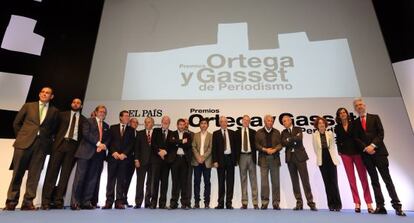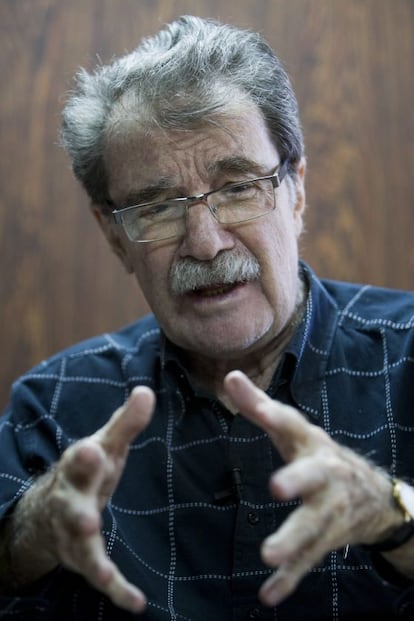Ortega y Gasset Awards pay tribute to bravery of the free press
Media restrictions in Venezuela form focus of gala for EL PAÍS-awarded journalism prizes

The Ortega y Gasset Awards for Journalism gala in Madrid on Wednesday night was marked by the sad absence of one of its main winners after the Venezuelan government stopped him from traveling to Spain to pick up his prize.
Teodoro Petkoff, a former guerrilla leader in the 1960s who has become a symbol for press freedom in his country, instead addressed the ceremony at the capital’s CaixaForum in a video.
“I have a country that is my jail,” said the 83-year-old publisher of the daily TalCual in a sharp, clear voice that boomed throughout the auditorium.
Petkoff is the irrepressible critical conscience of the left that believes in freedom for readers and voters” Former Spanish Prime Minister Felipe González
The recipient of this year’s career achievement award had been prohibited from leaving Caracas by Venezuelan President Nicolás Maduro as he faces a series of libel and defamation lawsuits filed against him by the authorities over reports that have appeared in his newspaper.
Over the last 15 years, TalCual has challenged press self-censorship and restrictions during the previous Hugo Chávez and current Maduro administrations.
In March, it was forced to close its print edition after the government began making it difficult for some publishers to obtain imported newsprint. TalCual continues as an internet operation.
Petkof said TalCual was the “voice of the best interests and aspirations of us Venezuelans who want to live in a country that is democratic, open and safe for all.”

In his brief but forceful remarks Petkoff, who ran for president on several occasions in the 1980s, accused the Venezuelan government of infringing on fundamental rights. “This prize goes to the brave Venezuela, which insists on living democratically,” he said.
Petkoff’s address was the highlight of the 32nd annual Ortega y Gasset Awards, which are handed out by EL PAÍS, and attracted a host of personalities from the realms of politics, culture and the economy.
In his opening remarks, EL PAÍS Editor-in-Chief Antonio Caño described journalism as a tool for “getting to know, innovating and relating one’s times with bravery and without nostalgia.”
Special focus was on the presence of former Spanish Prime Minister Felipe González, who accepted Petkoff’s award on his behalf.
González has said that he will travel to Venezuela on May 17 to help in the defense of two jailed opposition leaders despite the fact that the country’s lawmakers have officially declared him persona non grata.
He called Petkoff “the irrepressible critical conscience of the left that believes in freedom for readers and voters. That is why he annoys so many people so much.”
Nobel Prize-winning novelist Mario Vargas Llosa said Petkoff has demonstrated that the Chávez and Maduro governments are not “progressive with ambitious reforms” but authoritarian and populist.
“This is a fairly won prize for someone who is a symbol of the democratic resistance against a regime that is closing more and more the small spaces in which independent and critical journalism can operate,” he said.
Other awards went to Gerardo Reyes of US Spanish-language network Univisión for his internet coverage of the mafias that control mining operations throughout Latin America.
Pedro Simón and Alberto di Lolli of El Mundo were awarded the print journalism prize for their series on wasteful spending in Spain.
José Palazón picked up the photography prize for his image of sub-Saharan migrants trying to scale the fences in Spain’s North African exclave of Melilla as a group of people play golf below.
Tu suscripción se está usando en otro dispositivo
¿Quieres añadir otro usuario a tu suscripción?
Si continúas leyendo en este dispositivo, no se podrá leer en el otro.
FlechaTu suscripción se está usando en otro dispositivo y solo puedes acceder a EL PAÍS desde un dispositivo a la vez.
Si quieres compartir tu cuenta, cambia tu suscripción a la modalidad Premium, así podrás añadir otro usuario. Cada uno accederá con su propia cuenta de email, lo que os permitirá personalizar vuestra experiencia en EL PAÍS.
¿Tienes una suscripción de empresa? Accede aquí para contratar más cuentas.
En el caso de no saber quién está usando tu cuenta, te recomendamos cambiar tu contraseña aquí.
Si decides continuar compartiendo tu cuenta, este mensaje se mostrará en tu dispositivo y en el de la otra persona que está usando tu cuenta de forma indefinida, afectando a tu experiencia de lectura. Puedes consultar aquí los términos y condiciones de la suscripción digital.








































